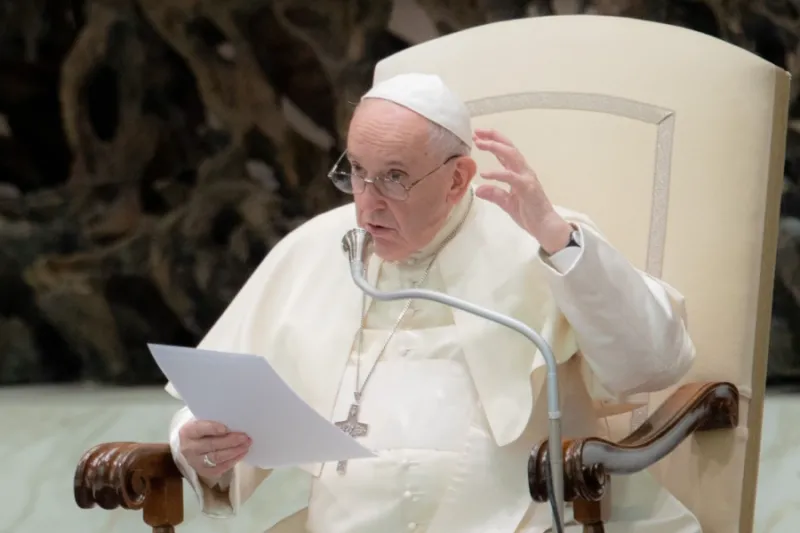
Vatican City, Aug 25, 2021 / 03:55 am (CNA).
Pope Francis said on Wednesday that hypocrisy within the Church is “particularly detestable.”
Speaking at the general audience in the Vatican’s Paul VI Hall on Aug. 25, the pope underlined that hypocritical behavior damaged Church unity.
“Hypocrisy in the Church is particularly detestable, and unfortunately there is hypocrisy in the Church, and there are many hypocritical Christians and ministers. We should never forget the Lord’s words: ‘Let what you say be simply Yes or No; anything more than this comes from evil,’” he said, quoting Matthew 5:37.
“Brothers and sisters, today, let us think about the hypocrisy that Paul condemns, and that Jesus condemns: hypocrisy. And let us not be afraid to be truthful, to speak the truth, to hear the truth, to conform ourselves to the truth, so we can love. A hypocrite does not know how to love.”
“To act otherwise means jeopardizing the unity of the Church, that unity for which the Lord Himself prayed.”
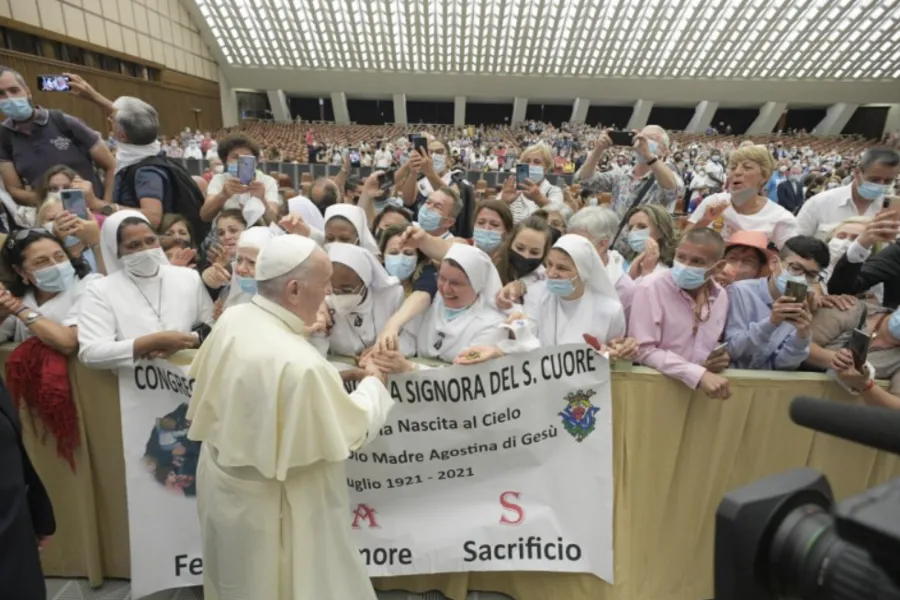
The pope’s live-streamed address, dedicated to the theme “The dangers of the Law,” was the sixth in his cycle of catechesis on St. Paul’s Epistle to the Galatians.
The pope reflected on Galatians 2:11-14, in which Paul recalls that he rebuked St. Peter for ceasing to eat with gentiles for fear of conflict with strict Jewish Christians, who stressed that Jews were prohibited from eating with non-Jews under Mosaic Law.
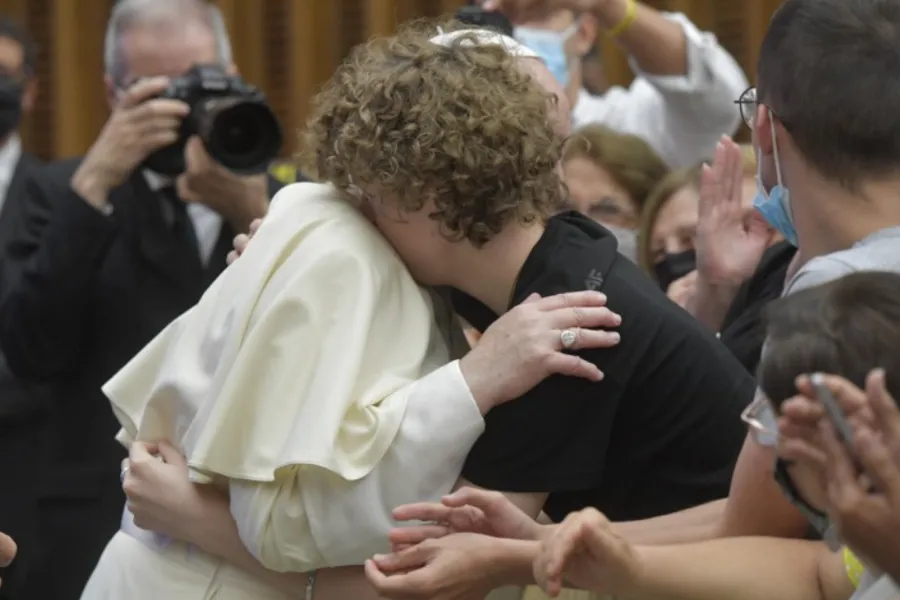
“First, Peter had been eating with the Christians of pagan origin without any difficulty; however, when some circumcised Christians from Jerusalem arrived in the city, he then no longer did so, because he did not want to incur their criticism,” the pope said.
“That’s the mistake: he was more focused on criticism, on making a good impression. And this is serious in Paul’s eyes, because other disciples imitated Peter, especially Barnabas, who with Paul had even evangelized the Galatians.”
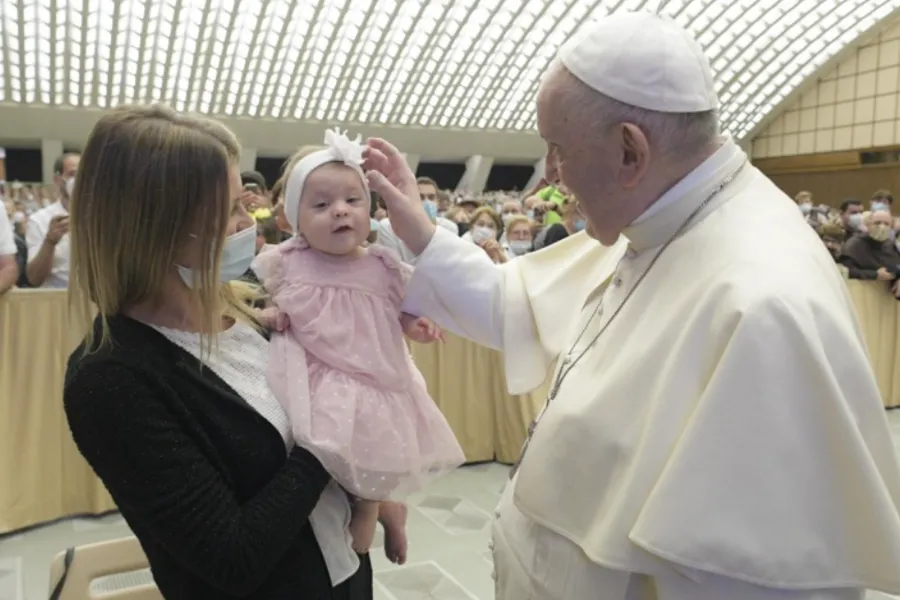
Pope Francis said that, without intending to, Peter was creating “an unjust division” within the community.
Addressing pilgrims who were seated in the hall and wearing face coverings to prevent the spread of COVID-19, the pope said that Paul was, in essence, accusing Peter of hypocrisy.
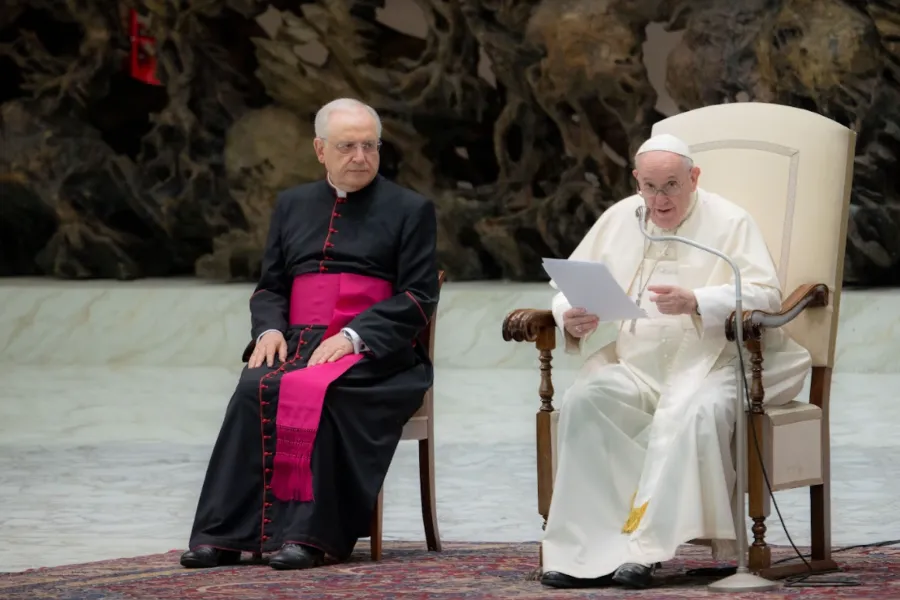
He suggested that hypocrisy could be defined as “the fear of the truth.”
“In an environment where interpersonal relations are lived under the banner of formalism, the virus of hypocrisy easily spreads,” he said.
He noted that hypocrisy is frequently condemned in the Bible. He highlighted the example of Eleazar, an elderly Jewish man who refused to save his life by eating meat sacrificed to pagan deities.

Quoting from the Second Book of Maccabees, the pope said that Eleazar had refused because the younger generation would conclude that he had “gone over to an alien religion” and be led astray.

“What a beautiful episode to reflect on to distance ourselves from hypocrisy,” the pope remarked. “The Gospels, too, report several situations in which Jesus strongly reproaches those who appear just externally, but who internally are filled with falsity and iniquity.”
He encouraged pilgrims to read the 23rd chapter of St. Matthew’s Gospel and note how many times Jesus refers to “hypocrites.”
He added that hypocrites are people who “pretend, flatter, and deceive” because they lack the courage to face the truth.
“For this reason, they are not capable of truly loving — a hypocrite does not know how to love — they limit themselves to living out of egoism and do not have the strength to show their hearts transparently,” he said.
“There are many situations in which hypocrisy is at work. It is often hidden in the workplace where someone appears to be friends with their colleagues while, at the same time, stabbing them in the back due to competition. In politics, it is not unusual to find hypocrites who live one way in public and another way in private.”
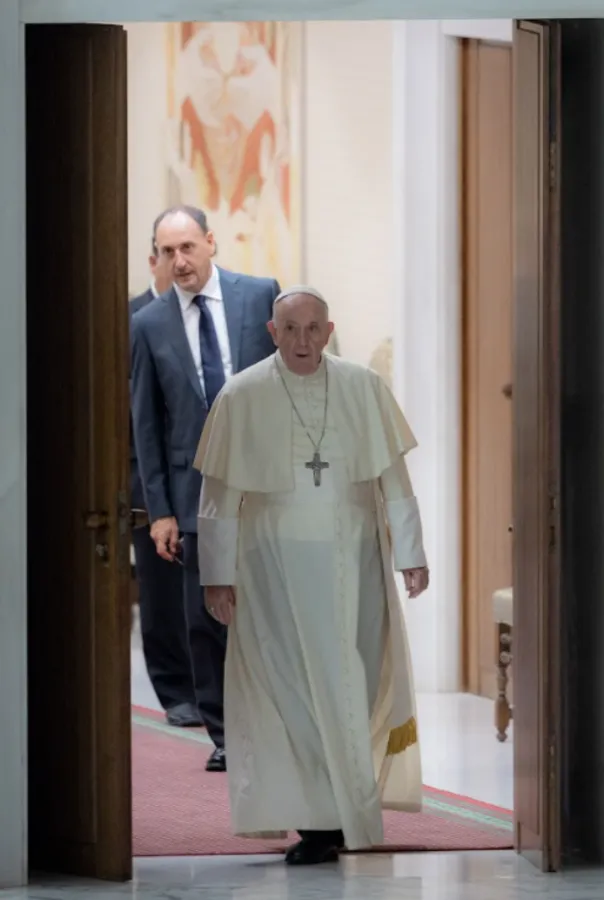
After the address, a precis of the pope’s catechesis was read out in seven languages.
In his remarks to Polish-speaking pilgrims, the pope noted that Aug. 26 is the feast day of Our Lady of Częstochowa, who is venerated at the Jasna Góra Monastery in southern Poland.
He recalled that in 2016, during World Youth Day in Kraków, he visited the icon also known as the Black Madonna of Częstochowa.
“Five years ago, I was able to stand with young people before her black countenance and entrust to her the Church in Poland and the world,” he said.
“May her maternal protection be for you, your families, and all Poles a source of peace and every good. I bless you from my heart.”
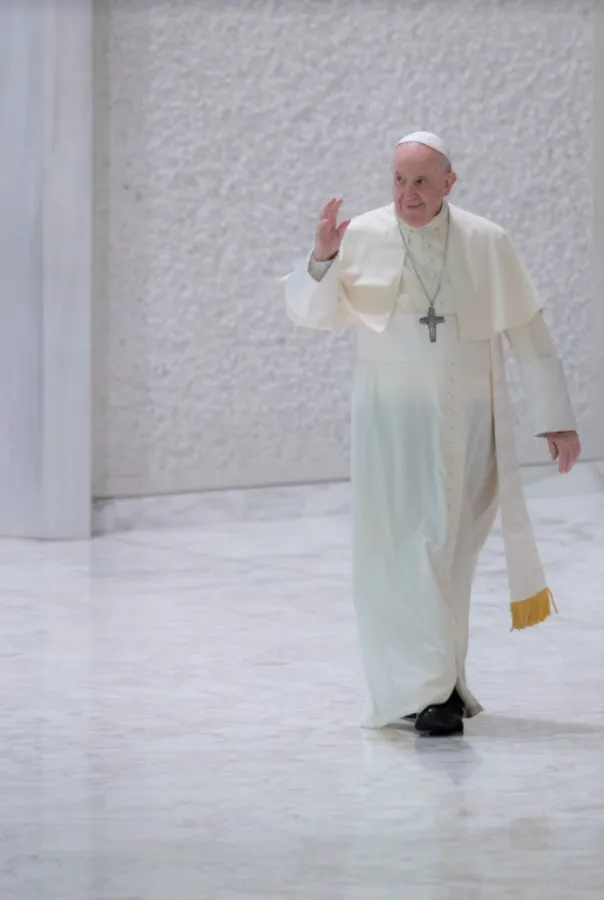
He then sent his best wishes to athletes taking part in the Paralympic Games in Japan from Aug. 24 to Sept. 5.
“Yesterday, the Paralympics began in Tokyo. I send my greetings to the athletes and I thank them because they offer everyone a testimony of hope and courage. They, in fact, show how sporting efforts help to overcome seemingly insurmountable difficulties,” he said.
The pope also greeted Catholics from Montegallo, a commune in central Italy that was struck by an earthquake on Aug. 24, 2016.
“Dear brothers and sisters, your presence gives me the opportunity to turn my thoughts to the victims and to the communities of central Italy, including Accumoli and Amatrice, which have suffered the harsh consequences of that seismic event,” he said.
“With the concrete help of the institutions, it is necessary to give proof of ‘rebirth’ without letting distrust get in the way. I urge everyone to move forward with hope. Courage!”
The general audience ended with the recitation of the Our Father and the Apostolic Blessing.
After the audience, the pope stood up to greet individual bishops and priests, before being guided down the steps of the auditorium.
If you value the news and views Catholic World Report provides, please consider donating to support our efforts. Your contribution will help us continue to make CWR available to all readers worldwide for free, without a subscription. Thank you for your generosity!
Click here for more information on donating to CWR. Click here to sign up for our newsletter.





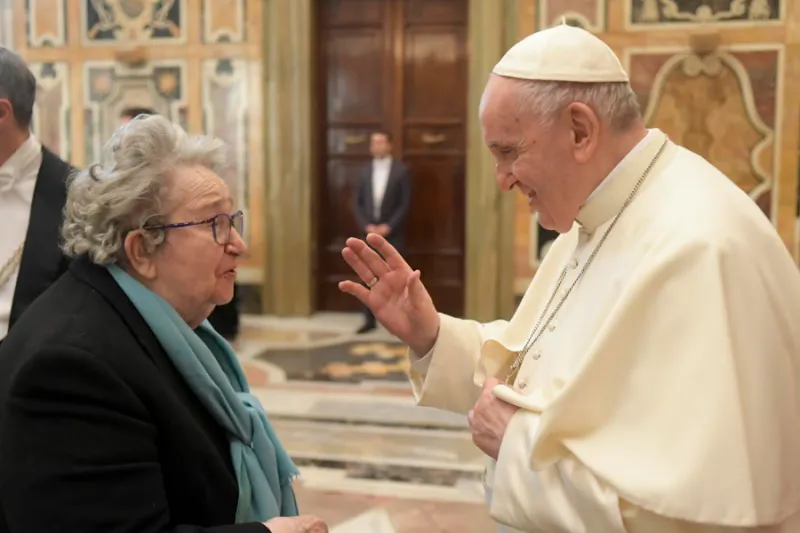
I’ve learned over the last 9 yrs. to not eat anything before reading most comments from this anti-pope imposter. Oh no, Father James is not a hypocrite, (Promote him) neither Cardinal Marx as he and his non-hypocrites send the Church into schism. These remarks were aimed at the Catholic faithful who insist on the truth of the Magisterium. God help us.
There he goes again. Like Barry, I need no pay for no weight loss plan. I need not listen to comedians either. Although I don’t think the Pope intends to humor us, the audacity and blind irony, are so ludicrous, I laugh. Then cry, then start my ‘counting’ beads and ejaculations to the good Lord for endurance and consolation.
Oremus.
Francis may wish to learn what St. Thomas Aquinas had to say about Paul confronting Cephas:
“Apropos of what is said in a certain Gloss, namely, that I withstood him as an adversary, the answer is that the Apostle opposed Peter in the exercise of authority, not in his authority of ruling. Therefore from the foregoing we have an example: prelates, indeed, an example of humility, that they not disdain corrections from those who are lower and subject to them; subjects have an example of zeal and freedom, that they fear not to correct their prelates, particularly if their crime is public and verges upon danger to the multitude.”
IOW, we the little laity, should have no fear to correct those under whom we are subject. We in our weakness, may, in our zeal, call upon the power and strength of Christ, made perfect in our weakness, to call to any prelate’s attention his error. And err this Francis has. Over and over. No more. Enough. Let chips and heads fall and roll as they may. The good of the Church of our Lord and Savior is at stake. Every one of us is a member of the Body of Christ, and Francis is no different in that regard. He is a member only of the Body of Christ; he is not its Head.
His Holiness adjures, Let what you say be simply Yes or No; anything more than this comes from evil! We’re hypocrites when we can’t love. Nowhere does he define what that hypocrisy is, the closest is Peter, circumcision, and adherence to the Law. Contextually, our remaining recourse is Amoris Laetitia’s relaxation of Rules. Often in fact consistently there’s the admonition by Francis to not be fixated on rules, to loosen up and basically learn to love. Thence a simple yes or no means yes to occasional laxity of practice considered love in contrast to no to rigor simply meaning in context obeying the commandments, to wit, the rules. If His Holiness intended to refer to the occasional, that is, exceptions, which may rarely occur, his overall doctrine in Amoris and elsewhere speak to a universal approach rather than exception. For example. Catholics believe that we are justified by Christ alone, in agreement with His Holiness. And we also firmly hold that absent of repentance there can be no justification. Now His Holiness calls this Pelagianism, an attempt to save ourselves without Christ and in agreement with Martin Luther insists on justification by Christ alone. A universal contrary to exception. All that’s required then is faith, not good works the effect of repentance. We must make a judgment on whether a doctrine holds water. Our recourse is the effects of a doctrine, how it’s interpreted and whether it’s tolerated by His Holiness. If Malta, Germany are proving ground we have universal rather than exception to the rule. Fortunately then, those of us who seem to fall into his basket of deplorable hypocrites are not Lutheran. We are Catholic by identity and practice.
What then in Amoris Laetitia would lead the priest to weigh judgment in favor of the penitent living in manifest adultery? The premises Ch 8 as couched predetermine the outcome of discernment. If a person divorced and remarried outside the Church believing in conscience justified, as to what some say was never a marriage strives to be faithful to his current union and to the Church offering Our Lord the best he can in his concrete situation we are compelled to be merciful on the basis of that person’s conscientious belief, his hardship situation in respect to a failed marriage for which he believes he is not responsible, and his benevolent disposition to the Church. That the Eucharist is a remedy for him that Amoris points to in n 351. Otherwise the priest is rigid and apparently detestably hypocritical. Elsewhere the Pontiff says we deny the penitent that which he requires. As presented in Amoris Pope Francis also refers to other “irregular unions” that fall into the same category for discernment. Irregular unions that imply cohabitation, same sex relationships the latter in respect to adults presently under continued revision within the relevant Dicasteries. In effect the premises noted above affect all moral doctrine.
I’ve read that fn. 351 (which you elaborate) is a footnote reduction of the inventive two-hour introduction to the synodal Amoris Laetitia, from Cardinal Kasper (once identified as Pope Francis’ favorite theologian). Surely Kasper wanted more than a somewhat incongruous footnote which now, nevertheless, still serves as fuel for the synodal way(ward) in Germania.
At its possible (remotely possible) best, is fn. 351 just another example of big-tent group authorship followed by inclusive/congregational editing? And, the drop of cyanide in the punch bowl.
And, now we have a sort of “dubia” submitted by Jewish rabbis questioning what is meant by very recent comments from Pope Francis, on the relationship between the (obsolete?) Torah and the Incarnation. The Law versus the freedom of Mercy, rather than both/and as with Christ as the “fulfillment of the Law” (Mt 5:17)..
Voices suggest that the new troublesome wording was simply penned by underling staff, and not properly vetted. Here’s what Pope St. John Paul II had to say about this false dichotomy:
“Freedom is properly so called to the extent that it implements the truth regarding the good. Only then does it become a good in itself. If freedom ceases to be linked with truth and begins to make truth dependent on freedom, it sets the premises for dangerous moral consequences, which can assume incalculable dimensions. When this happens, the abuse of freedom provides a reaction which takes the form of one totalitarian system or another. This is another form of corruption of freedom, the consequences of which we have experienced in the twentieth century” (Memory and Identity, 2005).
The task of Vatican ghost writers and editors is not only to PROCLAIM one truth (Mercy, for example), but to do this without UNSAYING other truths. Perhaps there are several reasons why this skill is so difficult.
Archbishop La Plata ARG Víctor Manuel ‘Tucho’ Fernández, theologian, advisor and acknowledged ghostwriter for the Pontiff said 8.10.17 in Medellin [theology journal of the Latin American Bishops’ Conference] referring to Pope Francis on Amoris that: “A pastoral discernment in the realm of the internal forum can have practical consequences in the manner of applying the discipline. His [Francis’] emphasis is rather on the question of the possible diminution of responsibility and culpability. Although it can be held with all clarity and forcefulness that sexual relations for the divorced in a new union constitute an objective situation of habitual grave sin, this does not imply that there necessarily exists grave sin in a subjective sense, that is to say, grave guilt” (Edward Pentin article NCR 8.21.17). Archbishop Fernandez is an acknowledged major contributor to the doctrinal thought of Pope Francis. Fernandez apparently perceived an entrée in the difference of objective grave sin from subjective culpability, which in instances due to mitigation the subject may not incur grave sin. Allegedly Ch 8 focuses on this premise, the Archbishop saying [I read somewhere] that “we laid out the argument and let him [Francis] spin it in Amoris”. While it is true the conditions under which an objective inherently grievous offence may not always incur grievous culpability, those conditions are rare. Reasonably assessed there must be severe conditions unlike the presumption that the circumstances of remarriage outside the Church present. Even if that improbability were the case we have the untenable issue of discernment. Pius X Pascendi Dominici Gregis 3, “We leave out of consideration the internal disposition of the soul, of which God alone is the judge”. Saint Ignatius’ doctrine of discernment was never intended for priests to be confessional soothsayers able to read souls. A priest is limited to judgment on the external matter. We stand by the long held conviction that God alone is judge of the internal state of the soul.
Stated differently outlier theologians like Víctor Manuel ‘Tucho’ Fernández propose that–in addition to objective morality, and in addition to special cases of mitigated culpability—there’s now a third category altogether, whereby objective morality is simply suspended, and this as a discernment emanating from the conflict-of-interest subjective conscience.
A third category? Where have we heard this before–the “third option!”
A progressive malignancy now reaching beyond simply the reassignment of abusive priests laterally from one parish to another. A malignancy working its way backward (so to speak) from concrete cases into doctrine and moral theology.
One final note. As to redeeming an adulterous union when reasonable evidence for declaration of nullity is not available by reliance on judgment based on sentiment, Francis’ Amoris doctrine effectively removes the rational basis for determining manifest sin, and in effect all sin. When in fact the Pontiff said, “Who am I to judge?” regarding an active homosexual who was presumptively “trying his best” he revealed his Amoris doctrine of merciful redemption for the sinner who persists in his sin effectively replacing repentance.
And of the dozens of Catholic couples I’ve known in “irregular relationships,” reflecting on the Church’s “rules” (God’s merciful plan for His creation) and their relationships, when they completed their tirades of invective with curse words, after they were able to catch their breath, they did not quite give much indication they were quite interested in anything like “repentance,” nor did they even seem any more concerned about the first families, or multiple families, they left behind than Francis the merciful, “anti-hypocritical” Pope indicated he did in AL.
In the overlapping worlds of atmospheric/political/cultural “climate” change(s), we have the simplifying darling of the Left, Greta Thunberg (Shirley Temple reincarnated?)—who is said to suffer from Asperger syndrome (AS).
This from the National Institutes of Health (NIH):
“Asperger syndrome (AS) is a developmental disorder. It is an autism spectrum disorder (ASD), one of a distinct group of neurological conditions characterized by a greater or lesser degree of impairment in language and communication skills, as well as repetitive or restrictive patterns of thought and behavior [!] [….] The most distinguishing symptom of AS is a child’s obsessive interest in a single object or topic to the exclusion of any other [!]. Children with AS want to know everything about their topic of interest and their conversations with others will be about little else. Their expertise, high level of vocabulary, and formal speech patterns make them seem like little professors [….]”
Can’t help but wonder if, in the overlapping universes of Revelation and Reason and the moral virtues (e.g., prudential judgment), there’s often a certificated and even clericalist equivalent to AS—-as in the myopia of overspecialized/ narrowed/exclusionary conceptual focus?
The humility and true enlightenment of AS versus the hypocrisy and rigidity of all those other “detestables”?
Let’s call a spade a spade. What you ask: “Can’t help but wonder if, in the overlapping universes of Revelation and Reason and the moral virtues (e.g., prudential judgment), there’s often a certificated and even clericalist equivalent to AS—-as in the myopia of overspecialized/ narrowed/exclusionary conceptual focus?”
I would say our Catholic heritage, our Catholic tradition, our Catholic Scriptures, our Catholic GOD would call that spade a SIN, a rejection of Revelation, a loss of faith, a scandal, and a sacrilege.
May God help such hideous souls. Oremus.
I am so tired of PF’s tirades.
I think our Pope should stop directing his tirades in the faithful and start cleaning up the moral, doctrinal and financial corruption in the Vatican, including by his closest supporters. If he does not then he himself would be a hypocrite.